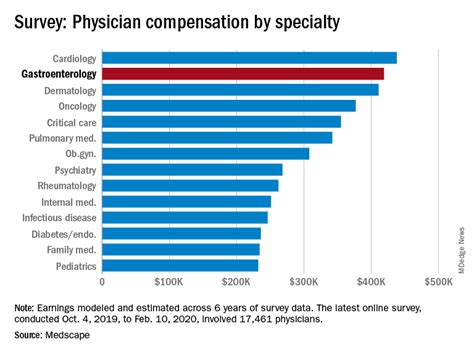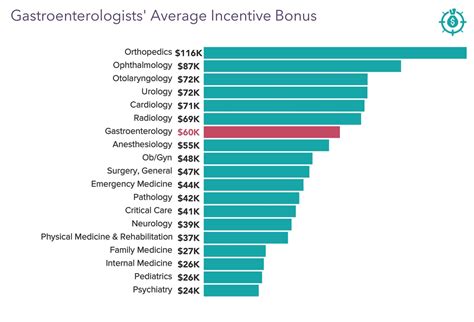Gastroenterology is one of the most dynamic and rewarding fields in modern medicine. For those considering this demanding but vital specialty, a key question is often about earning potential. A career as a gastroenterologist, or GI doctor, is not only intellectually stimulating and impactful but also one of the most financially lucrative medical professions. With average salaries comfortably exceeding $500,000 per year, it represents a significant return on a substantial educational and emotional investment.
This article provides a comprehensive breakdown of a GI doctor's salary, the key factors that influence it, and the promising future of the profession.
What Does a GI Doctor Do?


A gastroenterologist is a highly specialized physician focused on the health of the digestive system, also known as the gastrointestinal (GI) tract. Their expertise covers a wide range of organs, including the esophagus, stomach, small intestine, large intestine (colon), rectum, pancreas, gallbladder, and liver.
Key responsibilities include:
- Diagnosing and treating a vast array of conditions, such as acid reflux (GERD), ulcers, irritable bowel syndrome (IBS), Crohn's disease, ulcerative colitis, and liver diseases like hepatitis and cirrhosis.
- Performing crucial preventative screenings, most notably colonoscopies, to detect and prevent colorectal cancer.
- Conducting advanced endoscopic procedures to both visualize and treat issues within the GI tract, such as removing polyps, stopping internal bleeding, or clearing blockages.
Their work is a blend of long-term patient management in a clinical setting and high-skill, procedure-based interventions, making the role both challenging and diverse.
Average GI Doctor Salary


Gastroenterology consistently ranks among the top-earning medical specialties in the United States. The compensation reflects the extensive training required, the procedural nature of the work, and the high demand for their services.
Based on the most recent data from leading industry reports:
- Medscape's 2023 Physician Compensation Report, a widely respected industry benchmark, places the average annual salary for a gastroenterologist at $501,000.
- Doximity's 2023 Physician Compensation Report offers a similar figure, reporting an average of $500,400 per year.
It's important to view this average as a midpoint. A typical salary range for a GI doctor, as cited by platforms like Salary.com, can span from $382,000 (for those likely in their early career or in certain academic settings) to over $600,000 for highly experienced physicians in lucrative private practice settings.
Key Factors That Influence Salary


While the average salary is impressive, actual earnings can vary significantly based on several critical factors. Understanding these variables is key for any aspiring or practicing GI doctor aiming to maximize their career potential.
###
Level of Education
All physicians complete a rigorous and lengthy educational path, and gastroenterologists are no exception. This extensive training is the foundation of their high earning potential. The journey includes:
1. Bachelor's Degree (4 years)
2. Medical School (M.D. or D.O.) (4 years)
3. Internal Medicine Residency (3 years)
4. Gastroenterology Fellowship (3 years)
This totals 14 years of higher education and training after high school. Some may pursue further sub-specialty fellowships (e.g., in advanced endoscopy or transplant hepatology), adding another 1-2 years. The high salary is, in part, a return on this immense investment of time, effort, and financial resources, with many physicians graduating with significant student loan debt.
###
Years of Experience
As with most professions, experience plays a crucial role in compensation.
- Entry-Level (0-5 years): A GI doctor just completing their fellowship can expect to start in the $350,000 to $425,000 range, depending on the practice setting and location.
- Mid-Career (6-20 years): This is typically the period of peak earnings. Physicians have established a strong patient base, honed their procedural skills, and may have become partners in a private practice, pushing their income well above the $500,000 average.
- Late-Career (20+ years): Earnings remain high and stable. Some physicians may choose to reduce their hours or administrative duties, which could cause a slight dip in compensation, but they remain top earners.
###
Geographic Location
Where you practice matters tremendously. Physician salaries do not always correlate with the cost of living; in fact, some of the highest-paying regions are in areas with more moderate living expenses due to high demand and less market saturation.
According to the Doximity report, states in the Southeast and Midwest often offer higher-than-average compensation to attract and retain specialists. Conversely, major metropolitan areas on the coasts (e.g., New York City, Los Angeles) may offer slightly lower salaries due to a higher concentration of physicians and academic centers. However, these figures must be weighed against the local cost of living to understand the true value of the compensation package.
###
Company Type
The type of practice environment is one of the most significant determinants of a GI doctor's salary.
- Private Practice (Physician-Owned): This setting traditionally offers the highest earning potential. After a few years, physicians may be offered a partnership track, which gives them a share of the practice's profits. Owning a stake in ancillary services, such as an in-house endoscopy center, can dramatically increase income.
- Hospital-Employed or Health System-Owned: A growing number of physicians are choosing this route for its stability, predictable hours, and comprehensive benefits packages. While the base salary is strong and often includes production bonuses, the ultimate ceiling is typically lower than that of a successful private practice partner.
- Academic Medical Centers: These positions generally offer the lowest salaries. However, the compensation is balanced by other benefits, such as opportunities for teaching, conducting research, speaking at conferences, and often a better work-life balance.
###
Area of Specialization
While gastroenterology is itself a specialty, there are further sub-specializations that can influence earnings. Physicians who perform a high volume of complex procedures tend to command higher incomes.
For example, a GI doctor who specializes in advanced or interventional endoscopy (performing complex procedures like ERCP and endoscopic ultrasound) may have a higher earning potential than a general gastroenterologist whose practice is more focused on clinical consultation. Similarly, a hepatologist (liver specialist) in a transplant center also represents a highly sought-after and well-compensated sub-specialist.
Job Outlook


The career outlook for gastroenterologists is exceptionally strong. The U.S. Bureau of Labor Statistics (BLS) projects that employment for physicians and surgeons overall will grow by 3% from 2022 to 2032, which is about the average for all occupations. However, the demand for GI specialists is expected to be even more robust.
This demand is driven by several factors:
- An Aging Population: As the baby boomer generation ages, the need for preventative screenings like colonoscopies and the management of age-related digestive diseases will continue to rise.
- Increased Disease Prevalence: There is a growing incidence of conditions like Crohn's disease, GERD, and obesity-related GI issues, requiring specialized care.
- Advances in Technology: New diagnostic and therapeutic procedures are continually being developed, expanding the scope and necessity of gastroenterology.
Conclusion


A career as a GI doctor is a long and challenging path, but it culminates in a profession that is both personally fulfilling and financially rewarding. With an average salary landing at the very top of medical specialties, it offers exceptional financial security.
For those aspiring to enter this field, the key takeaways are clear:
- The earning potential is among the highest in medicine, with averages around $500,000.
- Peak earnings are influenced by experience, geographic location, and, most importantly, the type of practice setting.
- The highest incomes are typically found in physician-owned private practices, especially those with ancillary service ownership.
- The job outlook is excellent, driven by demographic trends and a growing need for specialized digestive care.
Ultimately, a career in gastroenterology offers a unique opportunity to make a profound impact on patient health while building a stable and prosperous future.
